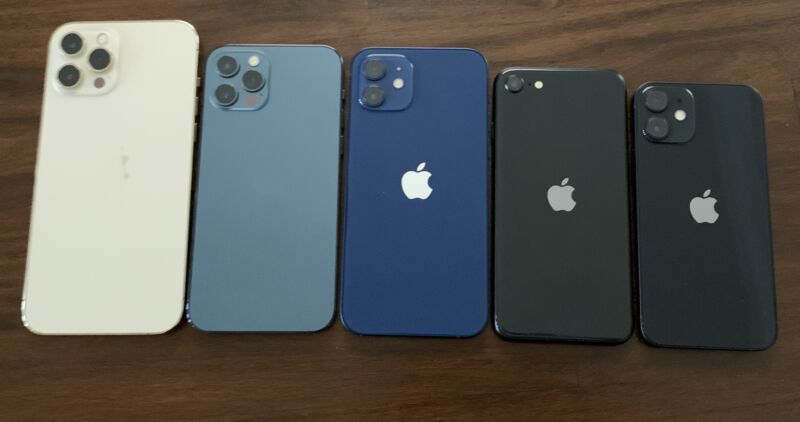
Samuel Axon
Apple has begun rejecting app submissions that do not follow its updated privacy policies regarding device fingerprinting and user tracking, according to a report in Forbes. This move strongly suggests that the release of iOS 14.5—and possibly new hardware products—is imminent.
Here’s a snippet from the rejection letter some developers told Forbes they have received:
Guideline 5.1.2 – Legal – Privacy – Data Use and Sharing
We found in our review that your app collects user and device information to create a unique identifier for the user’s devices. Apps that fingerprint the user’s device in this way are in violation of the Apple Developer Program License Agreement and are not appropriate for the App Store.
Specifically, your app uses algorithmically converted device and usage data to create a unique identifier in order to track the user. The device information collected by your app may include some of the following: defaultManager, NSLocaleCollationIdentifier, NSLocaleCountryCode, NSLocaleQuotationEndDelimiterKey, and NSLocaleGroupingSeparator.
Per section 3.3.9 of the Apple Developer Program License Agreement, neither you nor your app can use any permanent, device-based identifier, or any data derived therefrom, for purposes of uniquely identifying a device.
This message to developers makes it clear that affected apps are in violation because they use a technique that seeks to track the user without consent (device fingerprinting). A few months ago, Apple announced plans to implement “App Tracking Transparency,” which would require apps to request user opt-in to track them using IDFAs, a common tracking tool that is vital for many targeted advertising techniques. This change drew the ire of Facebook and other companies who rely on that type of tracking to maximize advertising revenue. But it’s also clear that App Tracking Transparency means that apps that seek to nonconsensually track users by any means, IDFA or otherwise, are going to face rejection. Device fingerprinting has often been used as an alternative to IDFA when users or platforms prevent the use of the latter.
Mobile marketing analyst Eric Seufert told Forbes that many thousands of apps might be rejected because, for at least some, the violation appears to be caused by an SDK from mobile analytics company Adjust; the company claims the SDK is used in more than 50,000 apps. Adjust has updated the SDK to remove at least some of the violating functionality, but not all developers are using the latest version.
Why this means iOS 14.5 is right around the corner
Though Apple already updated its developer guidelines to reflect the new tracking policy recently, the company has previously said that App Tracking Transparency would be enforced in the App Store, starting with the release of iOS 14.5 sometime this spring. The fact that apps are already being rejected on these grounds today makes a compelling case that several other Apple features and products are just days away now.
iOS 14.5 (and its close sibling iPadOS 14.5, which will almost certainly launch the same day as the iPhone software) is expected to be a major feature update to the mobile operating system. Based on what we’ve seen in recent beta releases, iOS 14.5 will include a feature that enables unlocking Face ID devices with a synced Apple Watch when you’re wearing a protective mask, numerous changes and tweaks to Siri, global support for dual-SIM 5G (this was previously only seen in China), support for PlayStation 5 and Xbox Series X|S controllers, hundreds of new emoji, and the aforementioned ad tracking change, among other things.
Product launches may be imminent, too
When Apple releases new hardware products, they are usually timed with new versions of the operating systems those products run—for example, an updated version of iOS usually lands the same week that a new iPhone model ships.
Reports from normally reliable sources have repeatedly predicted that a new iPad Pro model will be announced by Apple sometime during the spring. Based on history and some reports, it looked like that would happen in late March, but this expected time frame came and went. The product is still likely to come soon, though, meaning that an event sometime in April seems probable.
For that reason, the fact that Apple is now beginning to enforce this iOS 14.5-related rule with app developers might add to the evidence that a new iPad is coming soon.
Apple is also expected to announce several new, higher-end Macs that drop Intel CPUs in favor of Apple Silicon this year, and one or more of those could be announced this spring. Further, leaks and rumors continue to claim that Apple will soon introduce a Tile competitor with AR features, though several rumored launch windows for that product have come and gone over the past couple of years.
Apple is also known to be working on some kind of mixed reality headset, most likely focused primarily on augmented reality experiences. Some insiders have said the product could be announced this year, though we expect that Apple would announce an entirely new category like that at the company’s June developer conference rather than at a smaller, consumer-oriented spring product launch event. And it remains possible that the mixed reality headset announcement is further off still.



